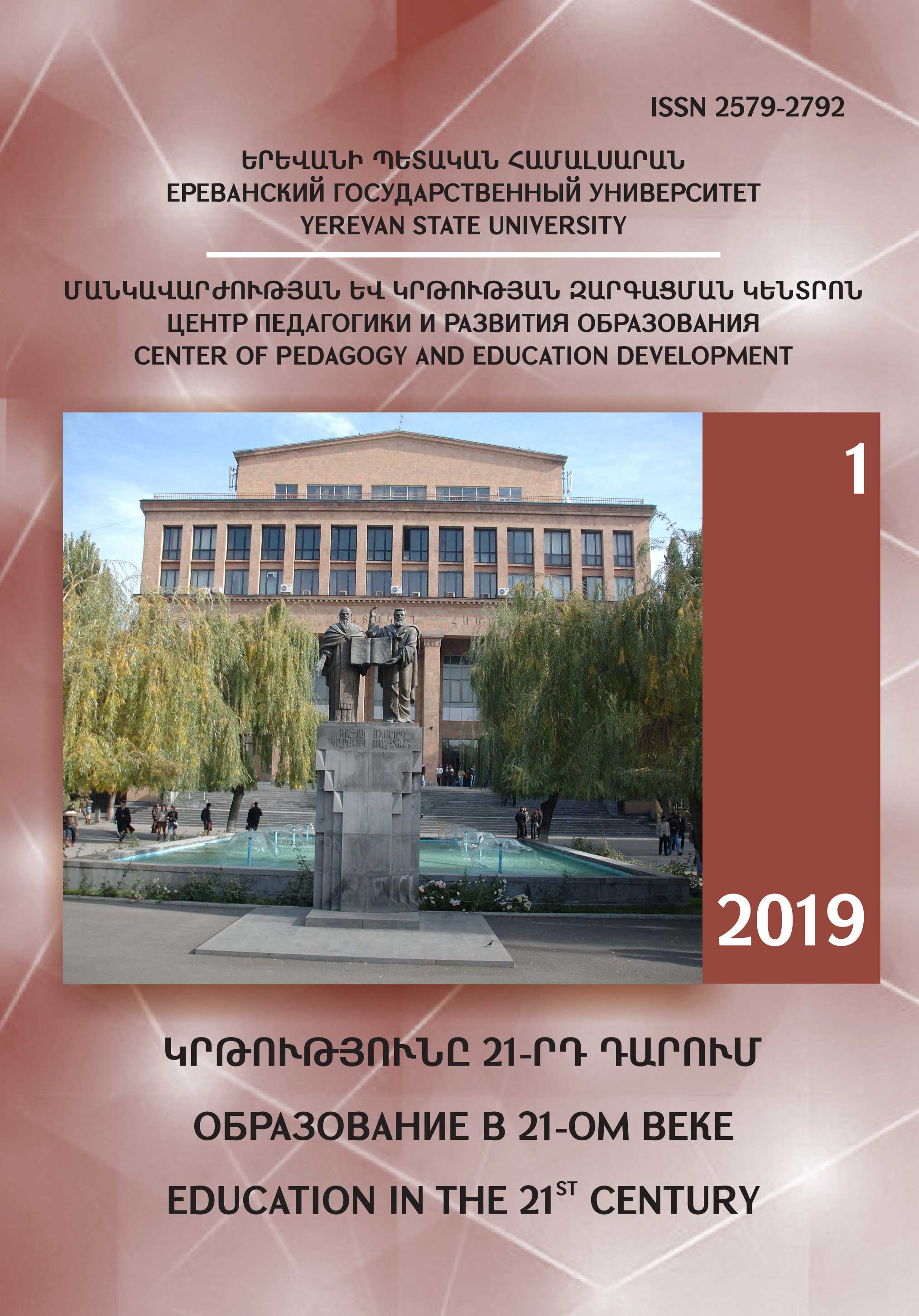SUBJECT-TO-SUBJECT INTERACTION IN THE EDUCATION PROCESS AS THE BASIS OF TRAINING FUTURE PROFESSIONALS TO INTERCULTURAL COMMUNICATION
DOI:
https://doi.org/10.46991/educ-21st-century.v1i1.10745Keywords:
միջմշակութային հաղորդակցություն, առարկա, առարկա-առարկա փոխազդեցություն, ուսումնական գործընթաց, սովորող, ուսուցիչ, առարկա-առարկա փոխազդեցության իրականացման մանկավարժական պայմաններAbstract
Short introduction. The processes of transformation and globalisation taking place in modern society increase the need for establishing a productive professional interaction of specialists both with domestic colleagues and with foreigners, regardless of the direction of their preparation. Thus, the problems arising before a specialist in the course of fulfilment of their functional responsibilities are not relating only to a professional nature. They are, as a rule, much more extensive and associated with the need for quality, productive interaction in conditions of intercultural communication. Thus, nowadays society needs highly skilled specialists who possess not only special professional knowledge, skills and abilities, but also professional and personal skills and qualities promoting more profound mastery of various types of activities (educational, cognitive, professional). In this context, it is important to note the necessity of such skills, abilities and qualities as: positive, tolerant attitude towards people; listening skills; the ability to understand others and empathize with others; the ability to assess the situation in a diverse way, predicting its possible consequences in advance; the ability to predict and prevent different conflict situations and as necessary to solve them quickly and mobile; the ability to assume responsibility and initiative in solving tasks, showing creativity, ingenuity, inventiveness , making constructive decisions; the ability to establish interrelationships, to cooperate; the desire for self-improvement. All of these skills, abilities and qualities are essential in the course of developing the subject-to-subject interaction, including interaction with a foreign partner, which gives the opportunity for achieving the most effective result during communication, in particular, intercultural.
The research problem. Today, an essential complex task raising before a teacher of higher education establishment is to help a student developing his/her own potential, taking into account individual needs, interests, abilities, inclinations and, at the same time, in order to effective cooperation, including with foreign colleagues, to teach a student tolerance and respect for thoughts, views and traditions of other people, based on mutual recognition, independence and creative cooperation. Indeed, this task is not possible without creating an effective pedagogical interaction of educational process participants based on trust, respect, collaboration and dialogue, in other words, without realizing the subject-to-subject interaction among a teacher and students in the process of their joint activity and direct communication, which will promote their professional development in conditions of intercultural communication.
Analysis of current research and publications related to the problem. Yu. Babansky, A. Brushlinsky, K. Karpinsky, V. Kremen, H. Meshko, S. Rubinshteyn, V. Slobodchikov, H. Tome, R. Motshnih-Pitrik have made an essential contribution to the study of key issues related to the organisation of subject-to-subject interaction. Many scholars have dedicated their own research to the issue of intercultural communication, in particular: M. Bakhtin, F. Batsevich, E. T. Hall, R. Grishkova, T. Novinger, I. Piller, E. Porter Richard, O. Sadokhin, S. Ting-Toomey. However, the problem of subject-to-subject interaction in the educational process and the analysis of its role in specialist’s professional formation in conditions of intercultural communication have not received the necessary attention.
The research purpose conducted within the framework of the article is to study the subject-to-subject interaction in the educational process as the basis for preparing a future specialist for intercultural communication.
References
References
Altukhova, A., Formation of subject-to-subject relations of a teacher and students in the educational process of a comprehensive school (PhD dissertation) Theses. Barnaul: Barnaul State Pedagogical University (in Russia), 2004.
Batsevich, F., Glossary of intercultural communication. Kiev: “Doveriye”, 2007.
Brushlinsky, A., Problems of subject’s psychology. Moscow: Institute of Psychology, Russian Academy of Sciences, 1994.
Kodzhaspirova, G. M., Kodzhaspirov, A. Yu., Pedagogical glossary. Moscow: “Akad-emiya”, 2000.
Mironova, I. A., Formation of students’ intercultural competence in the process of learn-ing foreign professional-oriented communication (PhD dissertation). Theses. St. Petersburg: Peters-burg Polytechnic un-t (in Russia), 2008.
Sadokhin, A. P., Introduction to intercultural communication theory. Moscow: “KIO-RUS”, 2014.
Slobodchikov, V., Isayev Ye., Fundamentals of psychological anthropology. Human psychology. Introduction to the psychology of subjectivity. Moscow: “Shkola-Press”, 1995.
Luzina, L. M. et al., In L. M. Luzina (Ed.). Glossary of pedagogical use. Pskov: “PGPI”, 2003.
Stepanov, A. M. et al., In A. M. Stepanov (Ed.). Psychological Encyclopaedia. Kiyev: “Akademizdatelstvo”, 2006.
Downloads
Published
How to Cite
Issue
Section
License

This work is licensed under a Creative Commons Attribution-NonCommercial 4.0 International License.

